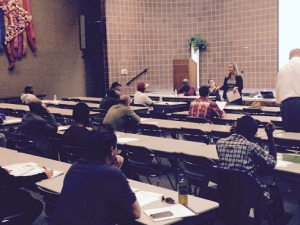“We call them clients. We call them returning citizens. We call them former offenders. But they’re people. And just like all of us, they have their hopes, aspirations, dreams, and they want to be reconciled with their families. They want to have a successful life. And they want a Second Chance,” said Second Chance Executive Director Ron Smith as he closed the Crime Commission’s April 20th, 2015 panel discussion.
The panel, which consisted of four current and past participants in the Second Chance program, were there to share their stories with the Crime Commission’s Board of Directors, made up of some of the most influential members of Kansas City’s business community. For those who missed our introductory blog, Second Chance is a resource program for people returning from prison, geared especially toward those at high risk to re-offend. The program’s primary goal is to assist with basic living needs like housing and employment, but as we learned from the examples in this panel, the Second Chance staff offers support in numerous other ways.
As Resource Specialist and moderator Addie pointed out, the program does what it can to aid in improving cognitive thinking skills. They had also assisted one of the panelists with obtaining identification, a necessity in any job search that many of us may take for granted. Perhaps most touching, though, was the story of a mother who recently regained custody of her son with the support of Second Chance, along with a few other area non-profits.
“I’m really happy to have him home, and just to wake him up to take him to school is the best feeling in the world,” she said.
Though each panelist’s background differed in areas like time served and offense committed, one major theme was present in all of their stories-the desire to take responsibility for their actions. One man had actually walked into the Second Chance office with a goal of working with Aim for Peace, a dream he has now achieved.
“I’ve spent so much of my life doing the wrong thing. I might as well commit the rest of it to doing the right thing,” he said.
The audience was obviously impressed, as one board member even told one of the men to get in touch about a possible job opening. The session made it clear that Second Chance truly is changing lives with their work. And that work doesn’t just stop when someone completes the program. As the mother who was mentioned earlier stated, “If I ever need the help, [Resource Specialist] Brittany is still here for me. I’ve graduated, but can still always go back, and [say], ‘Look, I’m struggling with this, and I don’t know how to get this help.’ And they’re still right there.”
